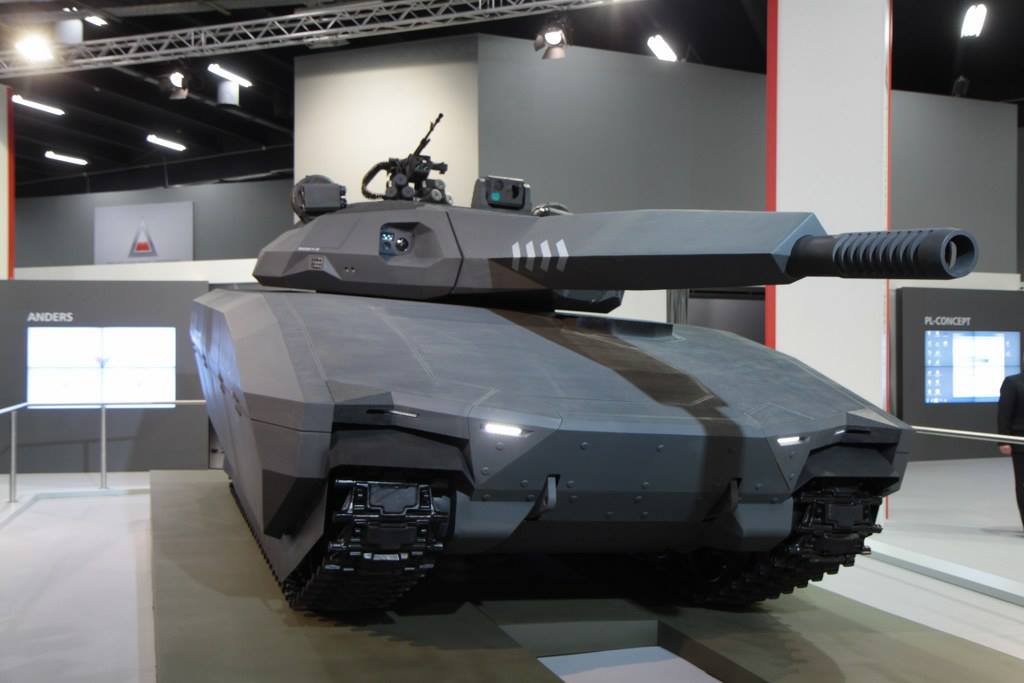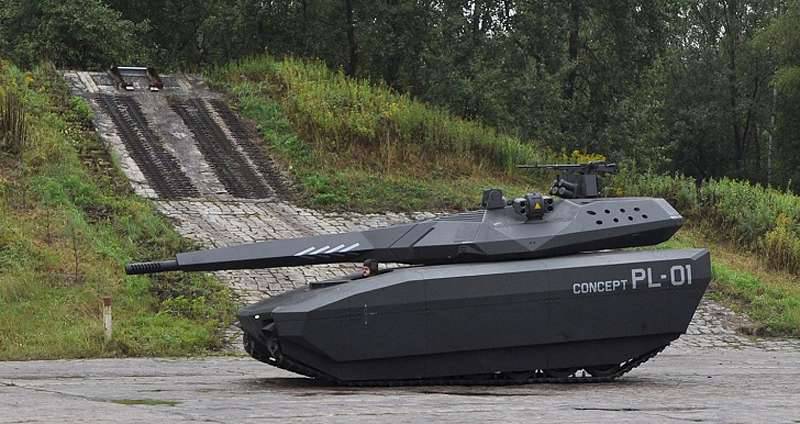
Specifications
Weight 30,000 kg (standard layout)
35,000 kg (with additional armour panels)
Length 7 mWidth 3.8 mHeight 2.8 m
Crew 3
Main
armament
105 mm or 120 mm caliber main cannon
Secondary
armament
7.62 mm machine gun
EngineDiesel engine
above 940 hp
SuspensionTorsion bar
Operational
range
500 km (on paved roads)
Speed 70 km/h (on paved roads)
50 km/h (on rough terrain)
PL-01 is a Polish armoured fighting vehicle created by OBRUM with support from BAE Systems, based on the Swedish CV90120-T light tank.[1][2] The concept vehicle was first unveiled at the International Defence Industry Exhibition in Kielce on 2 September 2013.With the program being approved, mass production is now confirmed and is scheduled to begin in 2018.
The layout of the PL-01 is similar to those of modern standard main battle tanks. The driver is located at the front of the vehicle's hull, with the commander and gunner also located in the hull and the unmanned turret mounted in the rear. In addition, there is a rear compartment in the hull which can accommodate four soldiers.[5] The vehicle chassis is based on that of the Combat Vehicle 90.
The vehicle armour has a modular ceramic-aramid shell, which is designed to provide protection compatible with NATO standard STANAG 4569 Annex A at level 5+ across the front portions of the hull and turret. Additional armour panels are mounted on the turret and hull, and are designed to provide full protection against a range of projectiles. The hull of the vehicle provides protection against improvised explosive devices (IEDs) and landmines in accordance with appendix B parts 4a and 4b of the STANAG 4569 standard. The entire vehicle will be covered with radiation-absorbent material.[5][7][8]
The PL-01 will be equipped with a 940 horsepower (700 kW)+ diesel engine coupled to a torque converter, automatic gearbox and driving assistance mechanism.[5] The suspension is based on seven wheels, with the drive shafts having active damping of torsion bars mounted on the first and last two pairs.[9] The vehicle can reach speeds of up to 70 kilometres per hour (43 mph) on paved roads and 50 kilometres per hour (31 mph) in rough terrain with a maximum range of 500 kilometres (310 mi). It can successfully climb an inclination of 30 degrees, cross ditches and trenches to a width of 2.6 metres (8 ft 6 in), and cross water obstacles with a depth of up to 1.5 metres (4 ft 11 in) without preparation, and up to 5 metres (16 ft) deep with preparation.

Weapons
The primary weapon of the PL-01 is a 105 or 120 mm cannon fitted within the unmanned turret, in accordance with NATO standards. The cannon will be able to shoot both conventional projectiles and guided anti-tank missiles. It has an autoloader, which ensures a shot fire rate of 6 shots per minute. The vehicle carries 45 rounds, 16 of which are located in slots within the turret and ready to fire, with the remainder stored within the chassis compartment. The tank is also armed with a 7.62 UKM-2000C machine gun with an ammunition supply of 1,000 rounds.
Additional equipment will be installed in a remote-controlled module. Presently the planned designs include a 7.62 or 12.7 machine gun or a 40 mm automatic grenade launcher with a supply of 750 rounds of 7.62 mm, 400 rounds of 12.7 mm or 96 rounds of 40 mm grenades. Also built into the turret is an active protection system which intercepts incoming missiles and smoke grenade launchers.
All equipment will be electronically stabilized, and observation and sighting systems will come with laser rangefinders, day-night cameras and third generation thermal imaging, with visual data displayed on a screen.

Equipment
The PL-01 will be fitted with a fire extinguishing system in the turret and hull, internal radio communication system, active anti-projectile protection system, battlefield management system, cooling exhaust system, thermal masking system, and air conditioning filters. The crew are provided with special seats to minimize the physical effects of nearby explosions. In addition, the vehicle may be equipped with a satellite navigation system and friend-foe identification system.

